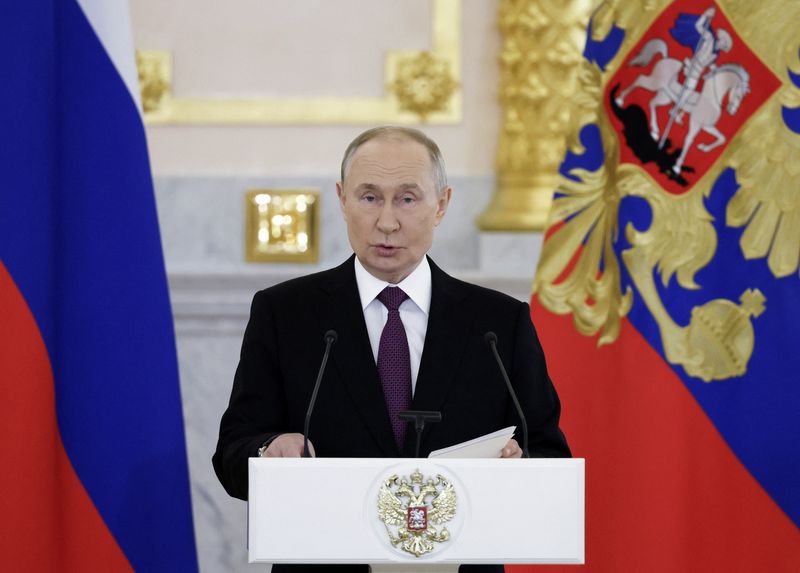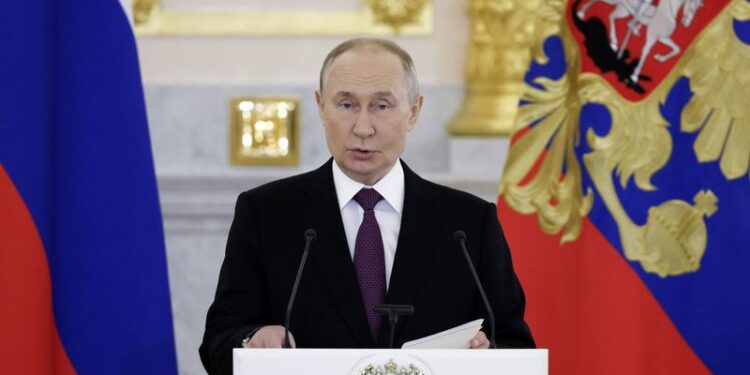By Guy Faulconbridge, Dmitry Antonov and Andrew Osborn
MOSCOW (Reuters) -The Kremlin reacted cautiously on Wednesday after Donald Trump declared victory in the U.S. presidential election, saying the U.S. was still a hostile state and that time would tell if Trump rhetoric on ending the Ukraine war translated into reality.
Russia’s invasion of Ukraine in 2022 triggered the biggest confrontation between Moscow and the West since the 1962 Cuban missile crisis when the Soviet Union and the U.S. came close to nuclear war.
Trump, a Republican, claimed victory in the 2024 presidential contest after Fox News projected that he had defeated Democrat Kamala Harris, which would cap a stunning political comeback four years after he left the White House.
Kremlin spokesman Dmitry Peskov said Trump had made some important statements about wanting to end the Ukraine war during his campaign, but only time would tell if they lead to action.
“Let us not forget that we are talking about an unfriendly country, which is both directly and indirectly involved in a war against our state” (in Ukraine),” Peskov told reporters.
Peskov said he was not aware of any plans by President Vladimir Putin to congratulate Trump on his victory and that relations with Washington were at an historic low.
“We have repeatedly said that the U.S. is able to contribute to the end of this conflict. This cannot be done overnight, but… the U.S. is capable of changing the trajectory of its foreign policy. Will this happen, and if so, how … we will see after (the U.S. president’s inauguration in) January.”
Russian and U.S. diplomats say relations between the world’s two largest nuclear powers have only been worse during the depths of the Cold War. Russian officials from Putin down said ahead of the election that it made no difference to Moscow who won the White House, even as Kremlin-guided state media coverage showed a preference for Trump.
Kirill Dmitriev, the influential head of Russia’s sovereign wealth fund, said a Trump victory could be a chance to repair ties.
“This opens up new opportunities for resetting relations between Russia and the United States,” added Dmitriev, a former Goldman Sachs banker who has previously had contacts with the Trump team.
In 2009, then U.S. Secretary of State Hillary Clinton proposed a “reset” with Moscow, but due to an apparent translation error presented Moscow with a symbolic button labelled “overload” in Russian instead of “reset”.
Despite the “reset”, relations between Putin and then U.S. President Barack Obama soured.
WAR IN UKRAINE
Trump, 78, has promised to swiftly end the war in Ukraine if elected, though he has not explained exactly how he would do that.
Putin has said he is ready to talk about a possible end to the war, but that Russia’s territorial gains and claims must be accepted, something that the Ukrainian leadership rejected as an unacceptable capitulation.
Russian forces are advancing at the fastest pace in at least a year in Ukraine and control about one fifth of the country.
That includes Crimea, which Moscow annexed from Ukraine in 2014, about 80% of the Donbas – a coal-and-steel zone – and more than 70% of the Zaporizhzhia and Kherson regions.
Former Russian President Dmitry Medvedev said on Wednesday that Trump’s win would probably be bad news for Ukraine, which relies on Washington as its top military backer.

“Trump has one useful quality for us: as a businessman to the core, he mortally dislikes spending money on various hangers–on,” Medvedev, now a senior security official, posted on his Telegram account.
“The question is how much Trump will be forced to give to the war. He’s stubborn, but the system is stronger,” he said.







